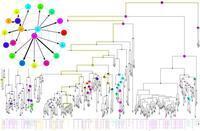Part of the group’s research interests lies in understanding the processes governing evolution at the molecular level. We focus on mechanisms taking place at the whole genome and the gene levels, on various time scales, ranging from the analysis of distantly related species to within-population data. Novel algorithms and statistical approaches are developed to decipher the processes that generated the observed genetic data.

- the mechanisms governing genome rearrangement during the course of evolution,
- the reconstruction of phylogenetic trees and networks from the analysis of large molecular data sets,
- phylogenetic methods to study metagenomic samples (e.g. of putative viral origin),
- predicting orthology and automatic annotation of genes using phylogenetics,
- genetic sequences as markers to date past evolutionary events, such as speciations or viral transmissions,
- understanding the current spatial distribution of populations or species,
- improving extant genomes assembly using phylogenetics.
- algorithms for finding genome rearrangements given biological constraints such as chromatin conformation,
- mathematical techniques and algorithms for fundamental problems in phylogenetic network inference (e.g. identifiability, exploring the search space, deciding tree containment)
- Bayesian inference techniques under coalescent models that incorporate geographical information in a continuous manner,
- heuristics to infer molecular phylogenies under the maximum likelihood criterion,
- algorithms for the comparison and reconciliation of multiple trees,
- distance-based methods for phylogenomic inference.
- CompPhy: collaborative platform for comparing phylogenies
- Sylvx: a viewer for phylogenetic tree reconciliations
- TreeDyn: visualizing and editing phylogenetic trees
- ERaBLE: efficient estimation of gene rates and branch lengths from phylogenomic datasets
- Alpha: comparative study of bacteriophage genomes
- PhyTime: Bayesian species divergence date inference
- FastME: a comprehensive, accurate and fast distance-based phylogeny inference program
- LSD: fast dating using the least-squares criterion
- scriptree: scripting phylogenetic graphics
- phylotype: mapping characters on phylogenies
- SMS: Smart Model Selection
- PhyREX : inference under coalescent with individuals distributed on a continuum
- PhyML: tree inference under the maximum likelihood criterion
- Mowgli: tree reconciliation for gene-species and host-parasite concerns
- ARt-DeCo: Assembly Recovery through Detection of Co-evolution
- Anne-Muriel Arigon Chifolleau
- Vincent Berry
- Fabio Pardi
- Annie Chateau
- Francois Chevenet
- Krister Swenson
- Vincent Lefort
- Stephane Guindon






